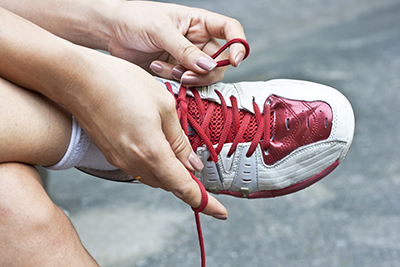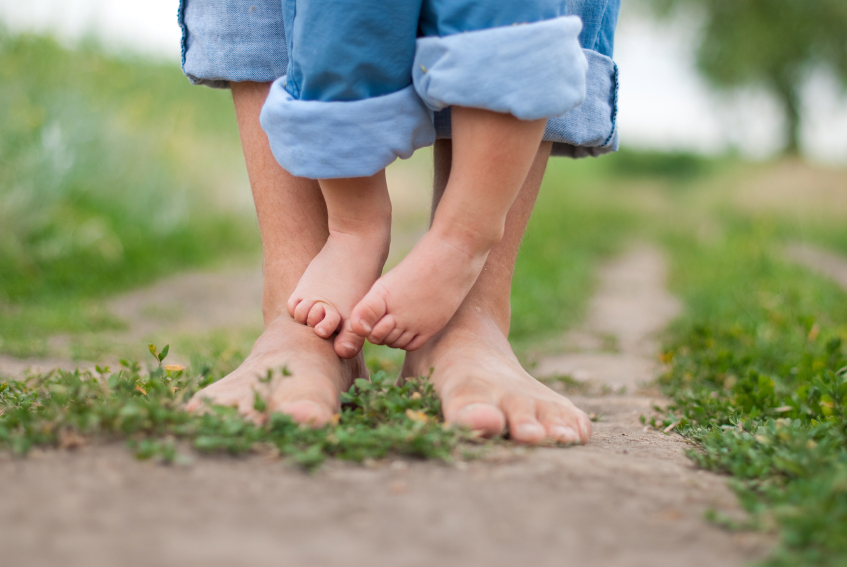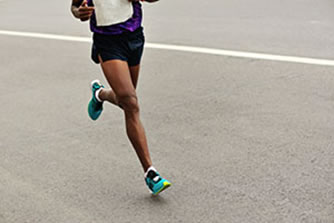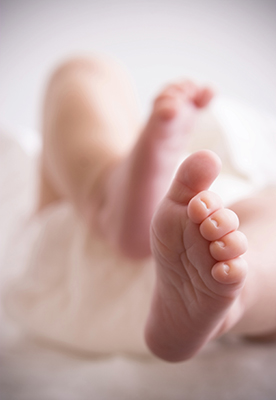Blog
Proper Fitting Shoes important for Exercise
 When you are about to exercise, you shouldn't wear old, worn-out shoes. A vast majority of foot issues develop as a result of wearing shoes that do not fit correctly. The most important things to look for when shoe shopping are proper fit and proper support. Shoes that have proper support will stabilize your feet and help prevent fatigue. You should also look for shoes that have cushioning. Investing in a good pair of shoes is important for your feet health because it will prevent a lot of injuries in the future.
When you are about to exercise, you shouldn't wear old, worn-out shoes. A vast majority of foot issues develop as a result of wearing shoes that do not fit correctly. The most important things to look for when shoe shopping are proper fit and proper support. Shoes that have proper support will stabilize your feet and help prevent fatigue. You should also look for shoes that have cushioning. Investing in a good pair of shoes is important for your feet health because it will prevent a lot of injuries in the future.
Finding a properly-fitting shoe is important in reducing injuries and preventing foot problems. For more information about treatment, contact Dr. Michael E. Newman of Pennsylvania. Our doctor can provide the care you need to keep your pain free and on your feet.
Proper Shoe Fitting
A common concern when it comes to foot health, having properly fitted shoes can help prevent injuries to the foot. Out feet affect our posture and gait, which in turn affects the biomechanics and overall bodily structure. With 33 joints, 26 bones, and over 100 ligaments, the potential for serious injury is much greater than one realizes. Although the feet cease growth in adulthood, they still change shape as they mature. Here are some factors to consider when it comes to investing in proper fitting shoes:
- Be sure the shoes fit correctly right away
- Ensure the ball of your foot fits comfortably in the widest portion of the shoes
- Even though they may look fashionable, improper fitting shoes can either create adverse conditions or exacerbate existing ones you may already have
- Walk along a carpeted surface to ensure the shoes comfortably fit during normal activity
Keeping in mind how shoes fit the biomechanics of your body, properly-fitting shoes is vitally important. Fortunately, it is not difficult to acquire footwear that fits correctly. Be sure to wear shoes that support the overall structure of your body. Do your feet a favor and invest in several pairs of well-fitted shoes today.
If you have any questions please feel free to contact one of our offices located in Plymouth Meeting and Ambler, PA. We offer the newest diagnostic and treatment technologies for all your foot and ankle needs.
Read more about proper shoe fitting.
Juvenile Arthritis and Your Child’s Feet
 There is a common misconception that adults are the only people who can develop arthritis. The term juvenile arthritis is used to describe rheumatic disorders in children. There isn’t a known cause of juvenile arthritis; however it is suspected that kids who do have it inherited genes from their parents that lead to its development. Some researchers also believe that environmental factors may play a role in the development of the condition. Juvenile arthritis can affect joints in the feet of children, and it is important for them to see a physician or podiatrist if they suspect they have it.
There is a common misconception that adults are the only people who can develop arthritis. The term juvenile arthritis is used to describe rheumatic disorders in children. There isn’t a known cause of juvenile arthritis; however it is suspected that kids who do have it inherited genes from their parents that lead to its development. Some researchers also believe that environmental factors may play a role in the development of the condition. Juvenile arthritis can affect joints in the feet of children, and it is important for them to see a physician or podiatrist if they suspect they have it.
Making sure that your children maintain foot health is very important as they grow up. If you have any questions contact Dr. Michael E. Newman of Pennsylvania. Our doctor can provide the care you need to keep your pain free and on your feet.
Keeping Children's Feet Healthy
Having healthy feet in childhood can help prevent medical problems later in life, namely in the back and legs. As children grow, their feet require different types of care from birth to school-age.
Although babies do not walk yet, it is still very important to take care of their feet.
- Avoid putting tight shoes or socks on his or her feet
- Allow the baby to stretch and kick his or her feet to feel comfortable
As a toddler, kids are now on the move and begin to develop differently. At this age toddlers are getting a feel for walking, so don’t be alarmed if your toddler is unsteady or ‘walks funny’.
As your child gets older, it is important to teach them how to take care of their feet
- Show them proper hygiene to prevent infections such as fungus
- Be watchful of any pain or injury
- Have all injuries checked by a doctor as soon as possible
- Comfortable, protective shoes should always be worn, especially at play
If you have any questions please feel free to contact one of our offices located in Plymouth Meeting and Ambler, PA. We offer the newest diagnostic and treatment technologies for all your foot and ankle needs.
Read more about Keeping Children’s Feet Healthy
Wear Good Quality Running Shoes
 Wearing the right shoe is very important when it comes to preventing foot injuries. If you plan on running, you should wear running shoes and not walking shoes. It is also important to buy good quality shoes for your feet. Cheap, poor quality shoes may increase the chance of you getting injured while running. You should look for shoes that are sturdy and are able to endure wear and tear. Lastly, you should make sure that your shoes fit properly and have a little bit of space at the front.
Wearing the right shoe is very important when it comes to preventing foot injuries. If you plan on running, you should wear running shoes and not walking shoes. It is also important to buy good quality shoes for your feet. Cheap, poor quality shoes may increase the chance of you getting injured while running. You should look for shoes that are sturdy and are able to endure wear and tear. Lastly, you should make sure that your shoes fit properly and have a little bit of space at the front.
If you are a runner, wearing the right running shoe is essential. For more information, contact Dr. Michael E. Newman of Pennsylvania. Our doctor can treat your foot and ankle needs.
Choosing the Right Running Shoe for Your Foot Type
To increase performance and avoid the risk of injury, it is important to choose the right running shoe based on your foot type. The general design of running shoes revolves around pronation, which is how the ankle rolls from outside to inside when the foot strikes the ground.
- Neutral runners are able to choose from a wide variety of shoes, including minimalist shoes or even go barefoot
- Runners who overpronate, or experience an over-abundance of ankle rolling, should choose shoes that provide extra motion control and stability
- Runners who underpronate, or supinate, have feet that have high arches and lack flexibility, preventing shock absorption. They require shoes with more flexibility and cushion
If you have any questions, please feel free to contact our office located in Plymouth Meeting and Ambler, PA. We offer the newest diagnostic and treatment technologies for all your foot and ankle needs.
Clubfoot in Newborn Babies
 A woman named Mary carried her daughter, Faye, to full term. Her ultrasound revealed that Faye had a clubfoot. Although Faye was a bit smaller than usual, she was expected to lead a normal and healthy life. As time progressed, the odds of Faye living began to decline. She was diagnosed with a disease called Trisomy 18 and eventually passed away.
A woman named Mary carried her daughter, Faye, to full term. Her ultrasound revealed that Faye had a clubfoot. Although Faye was a bit smaller than usual, she was expected to lead a normal and healthy life. As time progressed, the odds of Faye living began to decline. She was diagnosed with a disease called Trisomy 18 and eventually passed away.
Clubfoot, like many other conditions, requires the proper treatment and care. If you are seeking treatment, contact Dr. Michael E. Newman of Pennsylvania. Our doctor can properly diagnose any injuries or conditions and provide you with appropriate treatment options.
Clubfoot in Newborns
Clubfoot is a congenital disorder that can occur in 1 of 1,000 births per year. There are different causes for clubfoot, usually occurring as a result of genetics and pregnancy related complications. The abnormalities can be recognized during ultrasounds as early as the 20th week of pregnancy.
Treatment for Clubfoot
- Treatment involves reshaping the foot through surgery.
- Feet are moved into their correct position and placed into casts to ensure that it adjusts.
Non-Surgical Treatment
- Botox can be injected into the calf and weaken the Achilles tendon which allows the ankle to go back into a normal position.
After effects
Children who undergo treatment have not shown any further issues with their feet. There is always hope to overcome.
If you have any questions, please contact our offices in Plymouth Meeting and Ambler, PA. We offer the newest diagnostic and treatment technologies for all your foot and ankle needs.
Read more about clubfoot.
